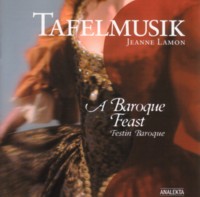A Baroque Feast
|
|
Maxine Eilader, harp |
Most compilations of Baroque orchestral music are culled from a corporation’s back catalogue. Others are unimaginative programs including the adagio by ‘Albinoni’ or Pachelbel’s Canon in D. Yet this entirely new disc by the superb Canadian baroque orchestra Tafelmusik is fresh and lively. It is a joy from beginning to end. Only the first 15 minutes of this generously filled disc represent Handel, yet this disc is an essential purchase if you are an admirer of either of the compositions chosen.
Although the sinfonia ‘The Arrival of the Queen of Sheba’ from Solomon is probably the most familiar work by Handel after Messiah and the Water Music, it retains its appeal. It would be churlish to deny that Tafelmusik give a particularly good performance of it, taken at a zestful speed that is surprisingly steady compared to the current fashion of performing it like an Olympic 100 meter sprint. The orchestral texture is rich, yet Tafelmusik avoid the preciousness that afflict some other period instrument orchestras, and its oboes in particular stand for no nonsense. This may be quite possibly the finest period instrument recording of this popular work yet made: it is both stylish and grand enough to satisfy most tastes.
The other Handel work is the sublime Harp concerto composed for Alexander’s Feast in 1736. A good performance of this little known yet precious gem never fails, and again Tafelmusik give a performance to eclipse most previous efforts. The opening Andante Allegro is taken slightly quicker than usual, yet it is lightly articulated, sensitively played, and never rushed. The performance has an atmosphere of affection for the music, and the Larghetto is especially lovely. Soloist Maxine Eilander plays with considerable feeling, but also with plenty of flair in the closing Allegro moderato. This lushly orchestrated concerto is one of Handel’s most magical compositions, and its gentle luminosity provides a fine contrast with the remainder of a program that avoids obvious repertoire. The result is a rich experience.

